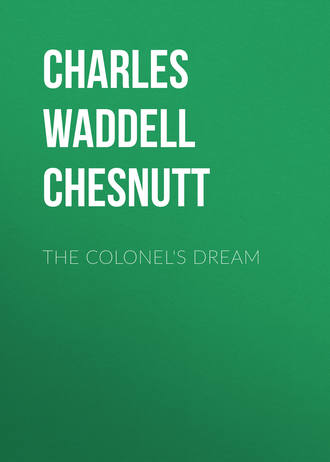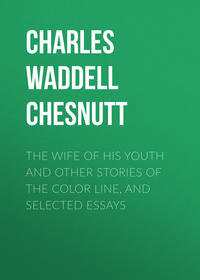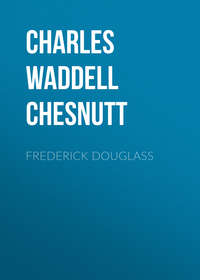 полная версия
полная версияThe Colonel's Dream
And white and black buried their dead in separate graveyards. Not until they reached God's presence could they stand side by side in any relation of equality. There was a Negro graveyard in Clarendon, where, as a matter of course the coloured dead were buried. It was not an ideal locality. The land was low and swampy, and graves must be used quickly, ere the water collected in them. The graveyard was unfenced, and vagrant cattle browsed upon its rank herbage. The embankment of the railroad encroached upon one side of it, and the passing engines sifted cinders and ashes over the graves. But no Negro had ever thought of burying his dead elsewhere, and if their cemetery was not well kept up, whose fault was it but their own?
The proposition, therefore, of a white man, even of Colonel French's standing, to bury a Negro in Oak Cemetery, was bound to occasion comment, if nothing more. There was indeed more. Several citizens objected to the profanation, and laid their protest before the mayor, who quietly called a meeting of the board of cemetery trustees, of which he was the chairman.
The trustees were five in number. The board, with the single exception of the mayor, was self-perpetuating, and the members had been chosen, as vacancies occurred by death, at long intervals, from among the aristocracy, who had always controlled it. The mayor, a member and chairman of the board by virtue of his office, had sprung from the same class as Fetters, that of the aspiring poor whites, who, freed from the moral incubus of slavery, had by force of numbers and ambition secured political control of the State and relegated not only the Negroes, but the old master class, to political obscurity. A shrewd, capable man was the mayor, who despised Negroes and distrusted aristocrats, and had the courage of his convictions. He represented in the meeting the protesting element of the community.
"Gentlemen," he said, "Colonel French has ordered this Negro to be buried in Oak Cemetery. We all appreciate the colonel's worth, and what he is doing for the town. But he has lived at the North for many years, and has got somewhat out of our way of thinking. We do not want to buy the prosperity of this town at the price of our principles. The attitude of the white people on the Negro question is fixed and determined for all time, and nothing can ever alter it. To bury this Negro in Oak Cemetery is against our principles."
"The mayor's statement of the rule is quite correct," replied old General Thornton, a member of the board, "and not open to question. But all rules have their exceptions. It was against the law, for some years before the war, to manumit a slave; but an exception to that salutary rule was made in case a Negro should render some great service to the State or the community. You will recall that when, in a sister State, a Negro climbed the steep roof of St. Michael's church and at the risk of his own life saved that historic structure, the pride of Charleston, from destruction by fire, the muncipality granted him his freedom."
"And we all remember," said Mr. Darden, another of the trustees, "we all remember, at least I'm sure General Thornton does, old Sally, who used to belong to the McRae family, and was a member of the Presbyterian Church, and who, because of her age and infirmities—she was hard of hearing and too old to climb the stairs to the gallery—was given a seat in front of the pulpit, on the main floor."
"That was all very well," replied the mayor, stoutly, "when the Negroes belonged to you, and never questioned your authority. But times are different now. They think themselves as good as we are. We had them pretty well in hand until Colonel French came around, with his schools, and his high wages, and now they are getting so fat and sassy that there'll soon be no living with them. The last election did something, but we'll have to do something more, and that soon, to keep them in their places. There's one in jail now, alive, who has shot and disfigured and nearly killed two good white men, and such an example of social equality as burying one in a white graveyard will demoralise them still further. We must preserve the purity and prestige of our race, and we can only do it by keeping the Negroes down."
"After all," said another member, "the purity of our race is not apt to suffer very seriously from the social equality of a graveyard."
"And old Peter will be pretty effectually kept down, wherever he is buried," added another.
These sallies provoked a smile which lightened the tension. A member suggested that Colonel French be sent for.
"It seems a pity to disturb him in his grief," said another.
"It's only a couple of squares," suggested another. "Let's call in a body and pay our respects. We can bring up the matter incidentally, while there."
The muscles of the mayor's chin hardened.
"Colonel French has never been at my house," he said, "and I shouldn't care to seem to intrude."
"Come on, mayor," said Mr. Darden, taking the official by the arm, "these fine distinctions are not becoming in the presence of death. The colonel will be glad to see you."
The mayor could not resist this mark of intimacy on the part of one of the old aristocracy, and walked somewhat proudly through the street arm in arm with Mr. Darden. They paid their respects to the colonel, who was bearing up, with the composure to be expected of a man of strong will and forceful character, under a grief of which he was exquisitely sensible. Touched by a strong man's emotion, which nothing could conceal, no one had the heart to mention, in the presence of the dead, the object of their visit, and they went away without giving the colonel any inkling that his course had been seriously criticised. Nor was the meeting resumed after they left the house, even the mayor seeming content to let the matter go by default.
Thirty-three
Fortune favoured Caxton in the matter of the note. Fetters was in Clarendon the following morning. Caxton saw him passing, called him into his office, and produced the note.
"That's no good," said Fetters contemptuously. "It was outlawed yesterday. I suppose you allowed I'd forgotten it. On the contrary, I've a memorandum of it in my pocketbook, and I struck it off the list last night. I always pay my lawful debts, when they're properly demanded. If this note had been presented yesterday, I'd have paid it. To-day it's too late. It ain't a lawful debt."
"Do you really mean to say, Mr. Fetters, that you have deliberately robbed those poor women of this money all these years, and are not ashamed of it, not even when you're found out, and that you are going to take refuge behind the statute?"
"Now, see here, Mr. Caxton," returned Fetters, without apparent emotion, "you want to be careful about the language you use. I might sue you for slander. You're a young man, that hopes to have a future and live in this county, where I expect to live and have law business done long after some of your present clients have moved away. I didn't owe the estate of John Treadwell one cent—you ought to be lawyer enough to know that. He owed me money, and paid me with a note. I collected the note. I owed him money and paid it with a note. Whoever heard of anybody's paying a note that wasn't presented?"
"It's a poor argument, Mr. Fetters. You would have let those ladies starve to death before you would have come forward and paid that debt."
"They've never asked me for charity, so I wasn't called on to offer it. And you know now, don't you, that if I'd paid the amount of that note, and then it had turned up afterward in somebody else's hands, I'd have had to pay it over again; now wouldn't I?"
Caxton could not deny it. Fetters had robbed the Treadwell estate, but his argument was unanswerable.
"Yes," said Caxton, "I suppose you would."
"I'm sorry for the women," said Fetters, "and I've stood ready to pay that note all these years, and it ain't my fault that it hasn't been presented. Now it's outlawed, and you couldn't expect a man to just give away that much money. It ain't a lawful debt, and the law's good enough for me."
"You're awfully sorry for the ladies, aren't you?" said Caxton, with thinly veiled sarcasm.
"I surely am; I'm honestly sorry for them."
"And you'd pay the note if you had to, wouldn't you?" asked Caxton.
"I surely would. As I say, I always pay my legal debts."
"All right," said Caxton triumphantly, "then you'll pay this. I filed suit against you yesterday, which takes the case out of the statute."
Fetters concealed his discomfiture.
"Well," he said, with quiet malignity, "I've nothing more to say till I consult my lawyer. But I want to tell you one thing. You are ruining a fine career by standing in with this Colonel French. I hear his son was killed to-day. You can tell him I say it's a judgment on him; for I hold him responsible for my son's condition. He came down here and tried to demoralise the labour market. He put false notions in the niggers' heads. Then he got to meddling with my business, trying to get away a nigger whose time I had bought. He insulted my agent Turner, and came all the way down to Sycamore and tried to bully me into letting the nigger loose, and of course I wouldn't be bullied. Afterwards, when I offered to let the nigger go, the colonel wouldn't have it so. I shall always believe he bribed one of my men to get the nigger off, and then turned him loose to run amuck among the white people and shoot my boy and my overseer. It was a low-down performance, and unworthy of a gentleman. No really white man would treat another white man so. You can tell him I say it's a judgment that's fallen on him to-day, and that it's not the last one, and that he'll be sorrier yet that he didn't stay where he was, with his nigger-lovin' notions, instead of comin' back down here to make trouble for people that have grown up with the State and made it what it is."
Caxton, of course, did not deliver the message. To do so would have been worse taste than Fetters had displayed in sending it. Having got the best of the encounter, Caxton had no objection to letting his defeated antagonist discharge his venom against the absent colonel, who would never know of it, and who was already breasting the waves of a sorrow so deep and so strong as almost to overwhelm him. For he had loved the boy; all his hopes had centred around this beautiful man child, who had promised so much that was good. His own future had been planned with reference to him. Now he was dead, and the bereaved father gave way to his grief.
Thirty-four
The funeral took place next day, from the Episcopal Church, in which communion the little boy had been baptised, and of which old Peter had always been an humble member, faithfully appearing every Sunday morning in his seat in the gallery, long after the rest of his people had deserted it for churches of their own. On this occasion Peter had, for the first time, a place on the main floor, a little to one side of the altar, in front of which, banked with flowers, stood the white velvet casket which contained all that was mortal of little Phil. The same beautiful sermon answered for both. In touching words, the rector, a man of culture, taste and feeling, and a faithful servant of his Master, spoke of the sweet young life brought to so untimely an end, and pointed the bereaved father to the best source of consolation. He paid a brief tribute to the faithful servant and humble friend, to whom, though black and lowly, the white people of the town were glad to pay this signal tribute of respect and appreciation for his heroic deed. The attendance at the funeral, while it might have been larger, was composed of the more refined and cultured of the townspeople, from whom, indeed, the church derived most of its membership and support; and the gallery overflowed with coloured people, whose hearts had warmed to the great honour thus paid to one of their race. Four young white men bore Phil's body and the six pallbearers of old Peter were from among the best white people of the town.
The double interment was made in Oak Cemetery. Simultaneously both bodies were lowered to their last resting-place. Simultaneously ashes were consigned to ashes and dust to dust. The earth was heaped above the graves. The mound above little Phil's was buried with flowers, and old Peter's was not neglected.
Beyond the cemetery wall, a few white men of the commoner sort watched the proceedings from a distance, and eyed with grim hostility the Negroes who had followed the procession. They had no part nor parcel in this sentimental folly, nor did they approve of it—in fact they disapproved of it very decidedly. Among them was the colonel's discharged foreman, Jim Green, who was pronounced in his denunciation.
"Colonel French is an enemy of his race," he declared to his sympathetic following. "He hires niggers when white men are idle; and pays them more than white men who work are earning. And now he is burying them with white people."
When the group around the grave began to disperse, the little knot of disgruntled spectators moved sullenly away. In the evening they might have been seen, most of them, around Clay Jackson's barroom. Turner, the foreman at Fetters's convict farm, was in town that evening, and Jackson's was his favourite haunt. For some reason Turner was more sociable than usual, and liquor flowed freely, at his expense. There was a great deal of intemperate talk, concerning the Negro in jail for shooting Haines and young Fetters, and concerning Colonel French as the protector of Negroes and the enemy of white men.
Thirty-five
At the same time that the colonel, dry-eyed and heavy-hearted, had returned to his empty house to nurse his grief, another series of events was drawing to a climax in the dilapidated house on Mink Run. Even while the preacher was saying the last words over little Phil's remains, old Malcolm Dudley's illness had taken a sudden and violent turn. He had been sinking for several days, but the decline had been gradual, and there had seemed no particular reason for alarm. But during the funeral exercises Ben had begun to feel uneasy—some obscure premonition warned him to hurry homeward.
As soon as the funeral was over he spoke to Dr. Price, who had been one of the pallbearers, and the doctor had promised to be at Mink Run in a little while. Ben rode home as rapidly as he could; as he went up the lane toward the house a Negro lad came forward to take charge of the tired horse, and Ben could see from the boy's expression that he had important information to communicate.
"Yo' uncle is monst'ous low, sir," said the boy. "You bettah go in an' see 'im quick, er you'll be too late. Dey ain' nobody wid 'im but ole Aun' Viney."
Ben hurried into the house and to his uncle's room, where Malcolm Dudley lay dying. Outside, the sun was setting, and his red rays, shining through the trees into the open window, lit the stage for the last scene of this belated drama. When Ben entered the room, the sweat of death had gathered on the old man's brow, but his eyes, clear with the light of reason, were fixed upon old Viney, who stood by the bedside. The two were evidently so absorbed in their own thoughts as to be oblivious to anything else, and neither of them paid the slightest attention to Ben, or to the scared Negro lad, who had followed him and stood outside the door. But marvellous to hear, Viney was talking, strangely, slowly, thickly, but passionately and distinctly.
"You had me whipped," she said. "Do you remember that? You had me whipped—whipped—whipped—by a poor white dog I had despised and spurned! You had said that you loved me, and you had promised to free me—and you had me whipped! But I have had my revenge!"
Her voice shook with passion, a passion at which Ben wondered. That his uncle and she had once been young he knew, and that their relations had once been closer than those of master and servant; but this outbreak of feeling from the wrinkled old mulattress seemed as strange and weird to Ben as though a stone image had waked to speech. Spellbound, he stood in the doorway, and listened to this ghost of a voice long dead.
"Your uncle came with the money and left it, and went away. Only he and I knew where it was. But I never told you! I could have spoken at any time for twenty-five years, but I never told you! I have waited—I have waited for this moment! I have gone into the woods and fields and talked to myself by the hour, that I might not forget how to talk—and I have waited my turn, and it is here and now!"
Ben hung breathlessly upon her words. He drew back beyond her range of vision, lest she might see him, and the spell be broken. Now, he thought, she would tell where the gold was hidden!
"He came," she said, "and left the gold—two heavy bags of it, and a letter for you. An hour later he came back and took it all away, except the letter! The money was here one hour, but in that hour you had me whipped, and for that you have spent twenty-five years in looking for nothing—something that was not here! I have had my revenge! For twenty-five years I have watched you look for—nothing; have seen you waste your time, your property, your life, your mind—for nothing! For ah, Mars' Ma'colm, you had me whipped—by another man!"
A shadow of reproach crept into the old man's eyes, over which the mists of death were already gathering.
"Yes, Viney," he whispered, "you have had your revenge! But I was sorry, Viney, for what I did, and you were not. And I forgive you, Viney; but you are unforgiving—even in the presence of death."
His voice failed, and his eyes closed for the last time. When she saw that he was dead, by a strange revulsion of feeling the wall of outraged pride and hatred and revenge, built upon one brutal and bitterly repented mistake, and labouriously maintained for half a lifetime in her woman's heart that even slavery could not crush, crumbled and fell and let pass over it in one great and final flood the pent-up passions of the past. Bursting into tears—strange tears from eyes that had long forgot to weep—old Viney threw herself down upon her knees by the bedside, and seizing old Malcolm's emaciated hand in both her own, covered it with kisses, fervent kisses, the ghosts of the passionate kisses of their distant youth.
With a feeling that his presence was something like sacrilege, Ben stole away and left her with her dead—the dead master and the dead past—and thanked God that he lived in another age, and had escaped this sin.
As he wandered through the old house, a veil seemed to fall from his eyes. How old everything was, how shrunken and decayed! The sheen of the hidden gold had gilded the dilapidated old house, the neglected plantation, his own barren life. Now that it was gone, things appeared in their true light. Fortunately he was young enough to retrieve much of what had been lost. When the old man was buried, he would settle the estate, sell the land, make some provision for Aunt Viney, and then, with what was left, go out into the world and try to make a place for himself and Graciella. For life intrudes its claims even into the presence of death.
When the doctor came, a little later, Ben went with him into the death chamber. Viney was still kneeling by her master's bedside, but strangely still and silent. The doctor laid his hand on hers and old Malcolm's, which had remained clasped together.
"They are both dead," he declared. "I knew their story; my father told it to me many years ago."
Ben related what he had overheard.
"I'm not surprised," said the doctor. "My father attended her when she had the stroke, and after. He always maintained that Viney could speak—if she had wished to speak."
Thirty-six
The colonel's eyes were heavy with grief that night, and yet he lay awake late, and with his sorrow were mingled many consoling thoughts. The people, his people, had been kind, aye, more than kind. Their warm hearts had sympathised with his grief. He had sometimes been impatient of their conservatism, their narrowness, their unreasoning pride of opinion; but in his bereavement they had manifested a feeling that it would be beautiful to remember all the days of his life. All the people, white and black, had united to honour his dead.
He had wished to help them—had tried already. He had loved the town as the home of his ancestors, which enshrined their ashes. He would make of it a monument to mark his son's resting place. His fight against Fetters and what he represented should take on a new character; henceforward it should be a crusade to rescue from threatened barbarism the land which contained the tombs of his loved ones. Nor would he be alone in the struggle, which he now clearly foresaw would be a long one. The dear, good woman he had asked to be his wife could help him. He needed her clear, spiritual vision; and in his lifelong sorrow he would need her sympathy and companionship; for she had loved the child and would share his grief. She knew the people better than he, and was in closer touch with them; she could help him in his schemes of benevolence, and suggest new ways to benefit the people. Phil's mother was buried far away, among her own people; could he consult her, he felt sure she would prefer to remain there. Here she would be an alien note; and when Laura died she could lie with them and still be in her own place.
"Have you heard the news, sir," asked the housekeeper, when he came down to breakfast the next morning.
"No, Mrs. Hughes, what is it?"
"They lynched the Negro who was in jail for shooting young Mr. Fetters and the other man."
The colonel hastily swallowed a cup of coffee and went down town. It was only a short walk. Already there were excited crowds upon the street, discussing the events of the night. The colonel sought Caxton, who was just entering his office.
"They've done it," said the lawyer.
"So I understand. When did it happen?"
"About one o'clock last night. A crowd came in from Sycamore—not all at once, but by twos and threes, and got together in Clay Johnson's saloon, with Ben Green, your discharged foreman, and a lot of other riffraff, and went to the sheriff, and took the keys, and took Johnson and carried him out to where the shooting was, and–"
"Spare me the details. He is dead?"
"Yes."
A rope, a tree—a puff of smoke, a flash of flame—or a barbaric orgy of fire and blood—what matter which? At the end there was a lump of clay, and a hundred murderers where there had been one before.
"Can we do anything to punish this crime?"
"We can try."
And they tried. The colonel went to the sheriff. The sheriff said he had yielded to force, but he never would have dreamed of shooting to defend a worthless Negro who had maimed a good white man, had nearly killed another, and had declared a vendetta against the white race.
By noon the colonel had interviewed as many prominent men as he could find, and they became increasingly difficult to find as it became known that he was seeking them. The town, he said, had been disgraced, and should redeem itself by prosecuting the lynchers. He may as well have talked to the empty air. The trail of Fetters was all over the town. Some of the officials owed Fetters money; others were under political obligations to him. Others were plainly of the opinion that the Negro got no more than he deserved; such a wretch was not fit to live. The coroner's jury returned a verdict of suicide, a grim joke which evoked some laughter. Doctor McKenzie, to whom the colonel expressed his feelings, and whom he asked to throw the influence of his church upon the side of law and order, said:
"It is too bad. I am sorry, but it is done. Let it rest. No good can ever come of stirring it up further."
Later in the day there came news that the lynchers, after completing their task, had proceeded to the Dudley plantation and whipped all the Negroes who did not learn of their coming in time to escape, the claim being that Johnson could not have maintained himself in hiding without their connivance, and that they were therefore parties to his crimes.
The colonel felt very much depressed when he went to bed that night, and lay for a long time turning over in his mind the problem that confronted him.
So far he had been beaten, except in the matter of the cotton mill, which was yet unfinished. His efforts in Bud Johnson's behalf—the only thing he had undertaken to please the woman he loved, had proved abortive. His promise to the teacher—well, he had done his part, but to no avail. He would be ashamed to meet Taylor face to face. With what conscience could a white man in Clarendon ever again ask a Negro to disclose the name or hiding place of a coloured criminal? In the effort to punish the lynchers he stood, to all intents and purposes, single-handed and alone; and without the support of public opinion he could do nothing.






